UKeiG 2018: Libraries of the Future
by Nicholas Heavey
I recently went to CILIP HQ to attend UKeiG 2018 Members’ Day to find out what is going on in the world of Geographic Information Systems, Smart Campuses and Intelligent Libraries, CILIP’s Privacy Project and how libraries and Wikimedia can work together. As it was my first library conference, I was interested to see what was going on in the information world and who exactly was in it. In attendance were information professionals from the NHS and the Home Office through to publishers and local libraries. The day offered up a feast of new ideas and I left feeling enthused about potential future projects. Below you will find information about some of the topics and ideas discussed on the day, as well as some useful links for anyone interested in finding out more.
David Row – Using GIS (Geographic Information Systems) data in libraries
The first session of the day was by David Row, who works for Libraries West, and focused on Geographic Information Systems (GIS). What is GIS I hear you say? GIS is a system, which captures and allows the user to manage, analyse and visualize geographic data. David wanted to discuss how libraries can use GIS data to improve our systems and reporting, where open access (OA) data can be sourced and the importance of making data available and reusable.
David spoke about the location data that can be collected from issuing a book. For example, where it was issued, where the person who borrowed it lives, where the book is stored/located, where the book was written and locations in the book, and where it was published. All of this information can be used to create a multitude of maps. For example, Mappit and Literary Atlas of Wales were two ways to map locations in books.
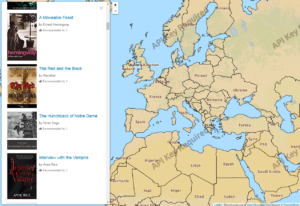
Paris literary locations map
As David works in public libraries they were interested in library locations and the relationships between percentage of population, distance, demographics and who uses the library. This data was being used to determine resources and funding, but he discussed the possibility of using it to identify groups who weren’t using the library.
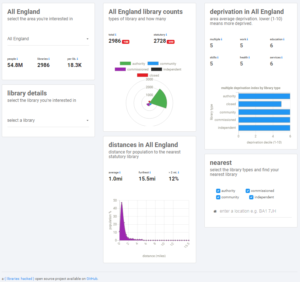
Project to display English libraries data in a data dashboard.
The data from openstreetmap.org was also used to plan routes for users to find the best way to get there [Wales Libraries Postcode Assessment]. He also used Wiki data to plot 5 mile radius, taking into account routes to plot real accessibility rather than just distance as a straight line between two points, and LIDAR* to create 3D maps of libraries in Wales and a visualisation of Somerset mobile libraries timetables.
*LIDAR: is a surveying method that measures distance to a target by illuminating the target with pulsed laser light and measuring the reflected pulses with a sensor.
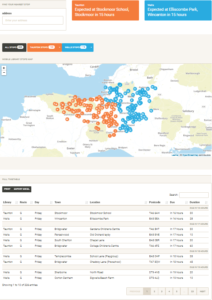
Somerset mobile library locations map
Below you can find a list of projects and some useful links to follow up on any of the projects mentioned or follow the progress of the work.
Completed projects:
- Visualising UK public libraries on Twitter. Showing latest tweets, latest accounts and tweet/follower counts.
- A project to visualise Somerset mobile libraries timetables. Uses a live departure board to display arrivals/departures.
- A project to display a dashboard of data about all libraries in England. Including type, locations, deprivation stats, and catchment areas.
Projects in Progress:
- A public libraries news data dashboard, with links to a WordPress plugin and shareable widget code for embedding PLN news data on any website.
- Browse Early English Books open data, as released by the Bodleian library.
- Compiling many libraries datasets, storing these on GitHub and visualising into a basic data portal.
- A project to search all UK public library catalogues in the UK at once. For personal use in finding books, and for data analysis.
Useful Links:
Global Book Map: https://www.mappit.net/bookmap/
Office for National Statistics: UK Geographies: https://www.ons.gov.uk/methodology/geography/ukgeographies
England Library Data: https://england.librarydata.uk/
More info on David’s work:
https://www.librarieshacked.org/
https://twitter.com/librarieshacked
James Clay – The Intelligent Library
The second session was by James Clay (Jisc) whose discussion was around the Smart Campus/Intelligent Library. The idea behind the Smart Campus is about working towards ways to dramatically improve the student experience by gathering and analysing data from across a university. Jisc are looking at effective ways to use data gathered from the physical environment and combine it with learning and student data from library systems, the virtual learning environment (VLE) and even on-site cafes and bars to deliver the best student experience. Jisc are developing the learning data hub, which essentially acts as an intermediary between existing and future systems, so it is easier for institutions to combine data from across the university and analyse it to optimise user experience.
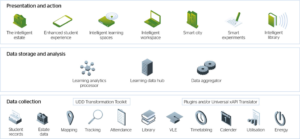
Bottom row shows where data is being collected, middle row is where the analysis occurs and top row shows where it is used.
The ideas hinge on the internet of things and sensors combined with the collection and analysis of the data collected. It is also crucial that we understand what the data is, how it can be used to benefit the producers of that data. Some of the key benefits discussed were:
- Improving the student experience – responding to student needs, providing timely and relevant information, enhancing learning opportunities
- Creating new opportunities for research including cross-disciplinary areas, societal challenges and the management of the research lifecycle
- Reducing environmental impact – monitoring energy usage and waste, and adjusting energy to meet needs in real time
- Enhancing the physical environment – making it more comfortable or conducive to learning
- Maximising use of valuable resources – including rooms and equipment, understanding availability and usage
Some of the other ideas James discussed were wayfinding and he suggested looking at how airports have tried to make wayfinding as intuitive as possible. For example, if a person knows where they need to be and how to get there it gives them more control over their journey e.g. you can look at information needs and movements throughout an area to determine the position of signs or reduce congestion and improve use of space. The Intelligent Campus would improve student experience and improve campus use.
Other improvements:
- The questions: What am I learning? How do I get there? What do I need on my reading list? and What is available on the library catalogue? could be answered without the need to visit 4 different sites.
- Turning off heat, light and computers when no students are using a space could be used to save energy and improve green credentials.
- Where are our students? Could we track them to improve Wi-Fi access or make suggestions of where to go when study rooms are busy or suggest the best times to go print, study, access a computer, etc.
- It was suggested that the data we have on a student’s learning, attendance and progress combined with current finances could help universities to anticipate difficulties or anxieties and respond to them instantly.
The session also briefly covered some problems and issues around this area. He briefly discussed the technical issues such as what can be counted as a single individual as a sensor may pick them up and have a phone, laptop and tablet. Issues around analysis: for example, drawing false conclusions about cause and effect. He also briefly discussed the ethical issues with collection and tracking individuals and the need for clear processes and policies, respecting individual privacy and ensuring students are aware and in control of their data and its usage.
Would you like to know more? Details below.
More information James’ work:
Intelligent Campus Blog: https://intelligentcampus.jiscinvolve.org/wp/
Mailing List: https://www.jiscmail.ac.uk/cgibin/webadmin?SUBED1=INTELLIGENTCAMPUS&A=1
Guide to the Intelligent Campus: https://repository.jisc.ac.uk/6882/1/Intelligent_Campus_Guide.pdf
Intelligent Campus: https://intelligentcampus.jiscinvolve.org/wp/2018/04/26/intelligent-campus-data-requirements/
John Lubbock – Wikipedia in the context of the information profession
The final session was by John Lubbock from the London chapter of Wikimedia. John is responsible for promoting the Wikimedia UK and increasing engagement with both institutions and the public. The core of his work is to encourage everyone to become a Wikipedian. The concept of a Wikipedian is intended to be open and inclusive, so you are a Wikipedian even if you only add a citation, edit or correct a page. The key idea is to work as part of a larger community. His presentation focused on the different ways in which libraries can get involved with Wikimedia. He wanted to draw out the idea that libraries and Wikipedia both work to provide free access to information and can support one another. Wikimedia wants to encourage and work with the information sector to improve the quality of the information across Wikimedia, in particular meta-data and citations.
He discussed a number of campaigns that libraries can get involved with and sessions that libraries can run for their users. There is an annual campaign to encourage librarians to add references to improve the quality of content called #1Lib1Ref.
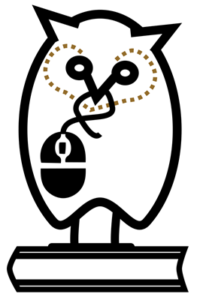
#1Lib1Ref logo
By using the Citation Hunt Tool or going to a particular article, everyone can add one citation to improve the overall quality of a range of pages. He gave an overview of a number of other projects such as Wiki loves monuments, an annual international photographic competition, the issues with a lack of biographies for notable women, and the need to create pages for minority languages.

Last year’s winner: West Pier: Matthew Hoser CC BY-SA 4.0
He also wanted to champion open access. On the Wikimedia Foundation front page it says ‘Imagine a world in which every single human being can freely share in the sum of all knowledge. That’s our commitment.’ Open access is a key part of the work and Wikimedia are working on a number of projects, such as Wikimedia Commons, an online repository of open access media files, which everyone can use, share, distribute and transform, even commercially. The approved licenses for Wikimedia content are CC0, CC-BY and CC-BY-SA; the emphasis on ShareAlike ensures that once something is in the public domain it remains there.
John suggested that if you’re interested in becoming a Wikipedian then you should look at criteria for the creation of pages; go to the Wikipedia pages on notability and identifying reliable sources, or if just want to find out more then look no further than below.
Useful Links:
Training Curriculum (for libraries): https://www.webjunction.org/explore-topics/wikipedia-libraries/training-curriculum.html
Commons:Structured data: https://commons.wikimedia.org/wiki/Commons:Structured_data
Improving URL citations on Wikimedia: https://www.mediawiki.org/wiki/Improving_URL_citations_on_Wikimeda
Identifying reliable sources:
https://en.wikipedia.org/wiki/Wikipedia:Identifying_reliable_sources
WikiProject Open Access aims to help Wikipedians cooperate, organize, and share ideas on improving open access-related articles on Wikipedia, and provide OA materials with a new life, through Wikimedia projects.
https://en.wikipedia.org/wiki/Wikipedia:WikiProject_Open_Access
Articles:
3 reasons Wikipedia needs libraries and vice versa: http://www.oclc.org/blog/main/three-reasons-wikipedia-needs-libraries-and-vice-versa/
Wikipedia + Libraries Better Together: https://www.webjunction.org/explore-topics/wikipedia-libraries.html
Wikipedia + Libraries Releases Curated Course Curriculum for Library Trainers: https://www.webjunction.org/news/webjunction/curriculum-announcement.html
Wikipedia:Wikipedia Loves Libraries: https://en.wikipedia.org/wiki/Wikipedia:Wikipedia_Loves_Libraries
Engaging the world’s libraries with Wikipedia: https://www.ifla.org/DE/node/10871
Librarypedia: The Future of Libraries and Wikipedia: http://www.thedigitalshift.com/2014/01/discovery/librarypedia-future-libraries- wikipedia/
GLAM/Case studies/Catalonia’s Network of Public Libraries: https://outreach.wikimedia.org/wiki/GLAM/Case_studies/Catalonia%27s_Network_of_Public_Libraries
What galleries, libraries, archives, and museums can teach us about multimedia metadata on Wikimedia Commons: https://blog.wikimedia.org/2018/01/29/glam- multimedia-metadata-commons/
Complete list of Wikimedia projects:
https://meta.wikimedia.org/wiki/Complete_list_of_Wikimedia_projects